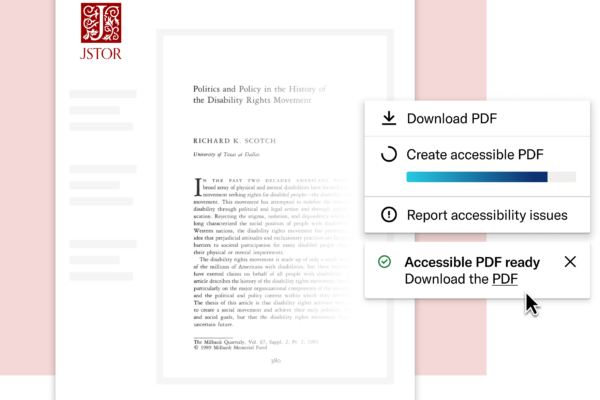Streamline research, gain metadata insights, and boost student success with JSTOR’s interactive research tool. We’ve designed its new features and enhancements to elevate your research experience. Now you can download conversation histories to track research progress, and cite responses in major academic formats to support transparent technology use.
Transform your teaching and research with tools and updates designed to support academic integrity.
Streamline research with conversation history


Keep track of evolving research paths with a new feature that allows you to download your conversations with the research tool as a PDF (and soon as HTML). Whether you’re a student working on a term paper or a librarian supporting research inquiries, this functionality simplifies workflows by offering a clear trail of interactions with the tool.
For educators: Faculty can use conversation histories to evaluate how students approach research questions, providing insights into their learning processes and critical thinking development.
Cite research tool responses with ease

We’ve introduced a new feature that allows users to cite responses by the research tool in APA, MLA, and Chicago formats. This update supports responsible research practices by encouraging transparency. Researchers can now cite specific responses or provide a general citation for the tool. In both cases, the stable link of the referenced item is included to ensure that all sources are credited accurately.
For librarians: This feature simplifies citation management while promoting responsible technology usage in research. Faculty and students can now meet academic standards for citation while leveraging AI and other advanced technologies to enhance their projects.
For researchers: Easily cite tool responses to uphold transparency and credit the works that inform your academic perspectives.
Support librarians to boost student success
These updates align with librarians’ roles as facilitators of research and learning.
- Easy wayfinding: By allowing students to revisit previous search paths, librarians can help them refine their queries and build on prior research without starting from scratch.
- Citation capabilities: Provide students with tools to accurately reference their research, ensuring adherence to academic integrity standards.
For librarians: Encourage students and researchers to improve their workflows, cite research materials, and engage deeply with scholarly research for improved outcomes.
Encourage student engagement and foster critical research skills
Librarians and faculty can integrate these tools into coursework and research guidance so students can explore JSTOR content more effectively. Early feedback from pilot programs highlights how these updates make research more interactive, intuitive, and fun—a win for student engagement and academic rigor.
For librarians: Leverage the new features to streamline research assistance and data management.
For educators: Use these tools to assess student research strategies and integrate dynamic activities into your teaching.
For students: Dive deeper into your topics with tools designed to enhance research integrity and efficiency.
Explore the research tool today and transform how you teach, learn, and discover!



